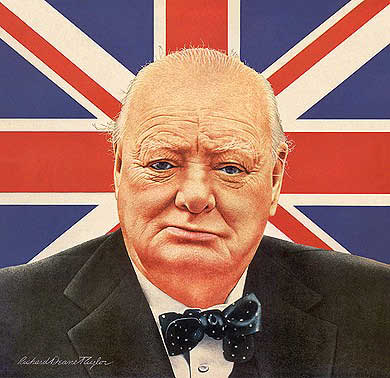 Recensione del volume “Churchill, Roosevelt, and the Birth of the Pax Americana” di Peter Clarke. (ediz. Bloomsbury Press, 560 pp. $35) tratta da “The New York Times” del 6 luglio 2008. Come gli inglesi vinsero la guerra e gli americani vinsero – poi – la pace
Recensione del volume “Churchill, Roosevelt, and the Birth of the Pax Americana” di Peter Clarke. (ediz. Bloomsbury Press, 560 pp. $35) tratta da “The New York Times” del 6 luglio 2008. Come gli inglesi vinsero la guerra e gli americani vinsero – poi – la pace
di Isaac Chotiner
If it were not for the subtitle of Peter Clarke’s sharp new history, “The Last Thousand Days of the British Empire: Churchill, Roosevelt, and the Birth of the Pax Americana,” readers could be excused for looking at the book’s title and having no idea what period of time was under consideration. Could it be the years leading up to 1997, when the British finally relinquished Hong Kong? Or perhaps the early 1960s, when Nigeria and the crown’s beloved Jamaica gained independence? One could even think of 1919, when the British massacred hundreds of Indians in the Punjabi city of Amritsar, as the year marking the beginning of the end. Indeed, the British Empire can be seen as reaching its terminus in almost every decade of the 20th century. What distinguishes the years 1944 to 1947 is that the British retreats in both Palestine and India were hastened by the same Anglo-American alliance that was so successful in vanquishing fascism. World War II presented British imperialists with two intractable problems. American aid may have enabled the British to fend off Hitler, but by 1945 Britain was faced with mounting financial obligations and a greater American military presence throughout the empire.
Meanwhile, the Roosevelt administration was intent on turning Churchill’s own rhetoric about freedom and liberty against him. As Clarke notes, the United States had a long-standing antipathy to British imperialism, and Roosevelt was concerned that the American public would think “their boys” had gone to fight in “foreign wars for the British Empire.” Any honest account of the 1940s requires a relatively cynical appraisal of the “special relationship” that is so much a part of both British and (especially) American mythology. Clarke’s greatest strength is that he recounts in painful detail the numerous humiliations and embarrassments that came with being the junior partner in a wartime alliance. His description of Churchill’s correspondence with Roosevelt is almost moving in its pathos: “The voluminous correspondence between the two – it ran to 2,000 communications in five years – was remarkable, but never enough for Churchill. He wrote eloquently and, above all, frequently to his new friend – far more frequently than the cool and canny president replied, always careful to keep his distance.”
Britain’s need to remain in the good graces of its former colony is most movingly seen in Churchill’s receptiveness to Treasury Secretary Henry Morgenthau’s vengeful plan to reduce a conquered Germany to a “pastoral” state. “Subsequently regarded as rather an embarrassment,” Clarke writes with perhaps too much understatement, the plan was embraced by Churchill because he was relentlessly focused on the terms of Lend-Lease repayments and felt he had no choice. Still, even if American anti-imperialism made Britain’s predicament worse, the British position in India, which takes up most of the second half of Clarke’s book, was becoming increasingly untenable on its own terms.
Britain owed India billions of pounds. What’s more, the popularity of Gandhi and the Congress Party (led by Jawaharlal Nehru) were obstacles to British rule that could not be overcome. Moreover, as Clarke astutely points out, the concessions toward Indian independence that had already been granted made it nearly impossible to get much economic benefit out of the subcontinent. Churchill made clumsy attempts to find some sort of compromise during the war, but to little avail. At the same time, his rhetorical exertions (he claimed that Indians were “a beastly people with a beastly religion”) were backed up by policies nothing short of criminal. Gandhi and Nehru were both imprisoned in 1942. The following year a calamitous famine in Bengal left three million people dead. London’s indifferent response to this disaster was, in Clarke’s word, “gruesome.” When Clement Attlee’s Labor government was elected in 1945, it found itself in an impossible situation, despite the fact that the new prime minister and much of his party had (admirably) favored Indian independence for quite some time. Churchill’s contempt for Hinduism accurately reflected the sentiments of the British ruling class, which had always been more sympathetic to monotheistic Islam. The problem was that London’s policy of divide and rule between Hindus and Muslims had left the Hindu-dominated Congress Party unwilling to compromise and Mohammad Ali Jinnah’s Muslim League even more desirous of its own state; the British, in Paul Scott’s arresting formulation, were being “scorched by fires” they themselves had set. Clarke makes clear, however, that Gandhi’s decision to “sabotage” crucial negotiations in the spring of 1946 robbed all parties involved of the last, best chance for a solution to the Hindu/Muslim question.
By the time Lord Mountbatten arrived in the country early in 1947, all he could do was get both sides to agree to partition, and then hastily retreat. Clarke is not especially diplomatic in evaluating British diplomacy. Yet his ultimate conclusion that Britain’s handling of the subcontinent was “not as bad” as the handling of Palestine (on which he spends considerably less time) is much too lenient. Not only did partition cause millions of deaths in 1947 and 1948, but the subsequent and arguably inevitable partition of Pakistan (which gave us Bangladesh) 25 years later was another humanitarian calamity. Meanwhile, Pakistan has had continuing trouble with Islamist extremists, and the nuclear-infused issue of Kashmir is arguably the most dangerous problem on earth. Jinnah, Pakistan’s founder, would be equally disturbed to learn that 60 years after partition it is not at all obvious that Pakistan is a better place for Muslims to live than its eastern neighbor. “The Last Thousand Days of the British Empire” may not have sexy revelations or counterintuitive reappraisals, but Clarke, the author of “Hope and Glory: Britain 1900-2000” and other books of British history, is an engaging narrator and a skilled summarizer. His generally anti-imperialist analysis is also made more persuasive by a wistfulness about the empire that will be familiar – even understandable – to anyone who has read John Buchan or Ian Fleming or any of the brilliant Indian-born authors writing in English, from Anita Desai and her daughter Kiran to Vikram Seth.
Referring to a “tragic destiny,” Clarke says “we simply need to recognize” that the British people’s finest hour in 1940-41 “left bills to be paid later. Defeat would obviously have spelled the end of the empire. But so did victory.” Fifteen years after that “finest hour,” Dwight Eisenhower told Prime Minister Anthony Eden that if British troops did not pull out of Suez, Eisenhower would cause the collapse of the pound. The Pax Americana had arrived. All of this could, from one point of view, be labeled tragic, but as is so often the case with history, ironic is probably the better word.
(Isaac Chotiner has written for The Washington Post, The New Republic and the Book Review)Isaac Chotiner


